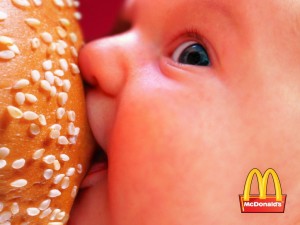
Thomas Robinson, a professor of pediatrics at Stanford University conducted an experiment by giving three- to five-year-olds two portions of identical foods, one set out on a McDonald’s wrapper. When children were asked to point out which foods tasted better, surprisingly, for hamburgers, French fries, baby carrots, milk or juice in a cup, kids would say the one on the McDonald’s wrapper tastes better. This is how advertising to children builds up brand loyalty.
This marketing strategy is unethical, though might be efficient. Children are vulnerable to commercials. Kids under the age of five cannot even recognize the difference between a television show and a commercial – the line between content and advertising is completely invisible to them. Children under the age of eight do not understand the motives of marketers and cannot resist persuasive claims. However, just because they do not recognize the advertisements for what they are does not mean that these commercials do not affect them. Marketing and advertising have massive power to shape children’s thinking and preferences, and therefore can easily build up children’s brand loyalty. This explains why kids from the previous experiment preferred food wrapped in McDonald’s packaging.
Dr. Victor Strasburger, an author of an American Academy of Pediatrics policy urging limits on marketing to children, states that the study illustrates how marketers attempt to “brand younger and younger children, to instill in them an almost obsessional desire for a particular brand-name product.” I believe that an ethical solution to this issue would be keeping children, who are lack of the cognitive skills and life experiences to recognize the persuasive intent of commercials, or to be more specifically, children under eight-year-old, away from all kinds of advertisements.
